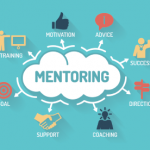As the demand for rheumatology services increases and the U.S. population ages, many rheumatologists struggle to maintain an academic research career due to time demands, insufficient funding, clinical workload and a lack of mentorship. Sustaining a research workforce pipeline is essential to advancing the understanding of the pathophysiology, prevention and treatment of rheumatic diseases. In a recent survey by the ACR Early Career Investigator Subcommittee of the Committee on Research, the lack of mentoring was a commonly reported barrier to a career in research and was cited by most rheumatologists who had left a research career.
The ACR has had success optimizing mentoring and career development for some rheumatology trainees through the ACR/Childhood Arthritis and Rheumatology Research Alliance Mentoring Interest Group (AMIGO) program, a national interinstitutional mentoring program for pediatric rheumatologists established in 2010. Similarly, “enhancing effective mentorship for [early career investigators] may be achieved through a broad-based intervention,” write Alexis Ogdie, MD, MSCE, and colleagues from Perelman School of Medicine, University of Pennsylvania, Philadelphia, in their latest research.
With its commitment to expanding support and resources for early career investigators, the ACR and its Early Career Investigator Subcommittee are looking to develop an interinstitutional platform to support mentorship of adult rheumatologists pursuing a career in research.
To assess mentorship in adult rheumatology, Dr. Ogdie and colleagues designed a mix-method study to identify perceived barriers to and facilitators of effective mentoring for early career rheumatology investigators, as well as to develop a framework for an interinstitutional mentoring program. Researchers conducted two focus groups and 10 interviews of early career investigators, rheumatology fellows, junior faculty and mentors who attended the ACR Rheumatology Research Workshop (RRW) in 2015. Twenty-five individuals participated. Sessions were recorded and analyzed using NVivo software.
Next, researchers developed a survey to assess interest in an interinstitutional mentoring program. The survey included questions on the career path and research interests of potential enrollees, methods of matching mentors with mentees, desired frequency of contact and materials needed to support the program. In August 2016, the survey was sent to adult rheumatology fellows who attended the previous two RRW meetings. The results of the study were published in March 2018 Arthritis Care & Research.
Mentors & Mentees
“Successful mentee-mentor relationships were defined by attributes of the mentor, the mentee and the relationship, and not necessarily by any one of these in isolation,” write the authors in their discussion. Communication, accessibility, regular meetings, shared interests and aligned goals were identified as critical to a successful relationship. Of these, communication was most important, specifically being able to have difficult conversations and discuss agreed upon expectations.



